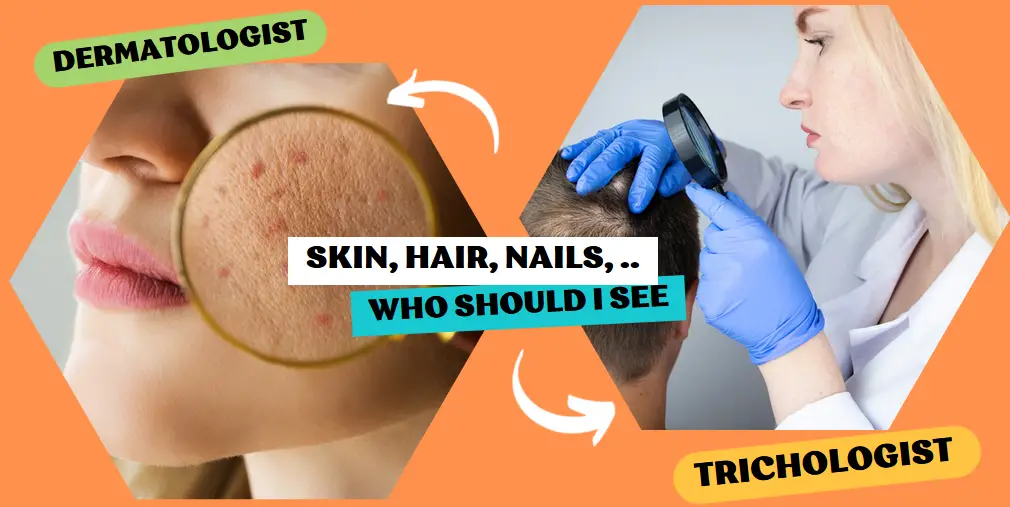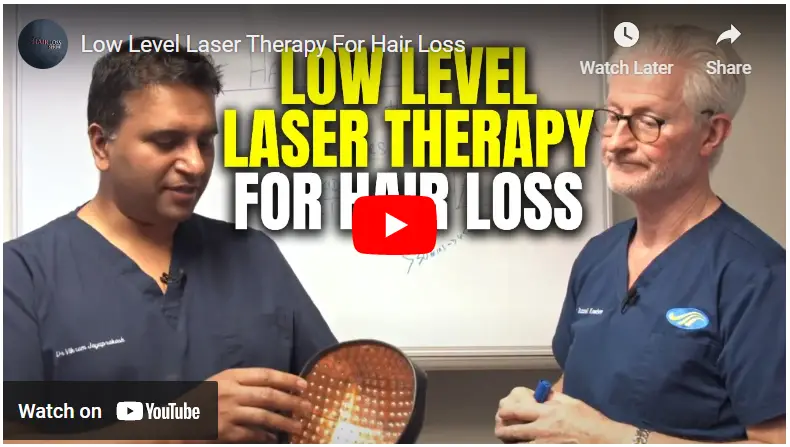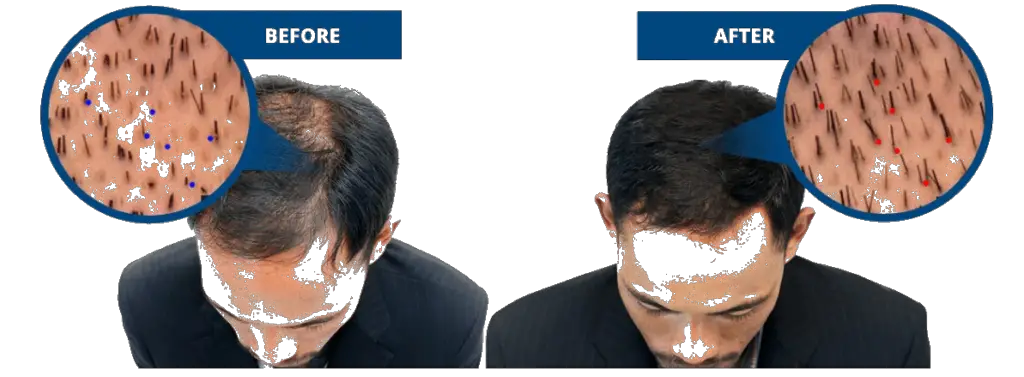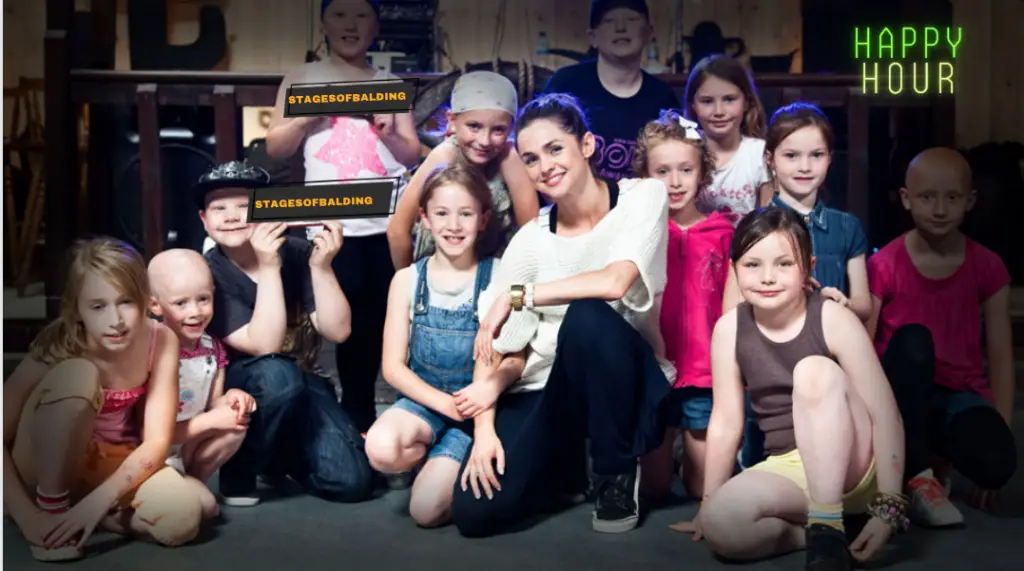Struggling with hair loss and confused between a trichologist and vs dermatologist? Learn who to consult for your specific needs.
When it comes to tackling the often sensitive and emotionally charged issue of hair loss, the first step is often the most crucial: choosing the right professional to consult. The dilemma usually boils down to deciding between a trichologist and a dermatologist. While both experts deal with hair and scalp issues, their approach, qualifications, and treatments can vary significantly. Understanding these differences is not just a matter of academic interest; it’s a vital part of making an informed decision that could have long-term implications for your hair health.
The choice between a trichologist and a dermatologist often hinges on several factors, including the severity of the hair loss, underlying conditions, and even budget constraints. For instance, a trichologist might be more focused on holistic treatments and may not be able to prescribe medications, while a dermatologist can offer medical interventions but might not look at lifestyle factors in depth.
If you’re wondering whether you need a referral to consult one of these professionals, you’re not alone. Many people are unsure about the initial steps in seeking help for hair loss. To clear up any confusion, check out our comprehensive guide on Do you need a referral to see a dermatologist?. This resource will provide you with the necessary information to take that all-important first step.
Don’t let uncertainty hold you back from addressing your hair loss. Whether you’re dealing with alopecia, thinning hair, or more severe forms of hair loss, understanding the roles of a trichologist and a dermatologist can guide you to the right professional. So, why wait? Dive deeper into our resources and make an informed decision today.
By the end of this comprehensive guide, you’ll have a clearer understanding of what a trichologist is, what a dermatologist does, and how to choose between them based on your specific needs. So, let’s delve into the intricacies of trichology and dermatology to help you make an informed choice.
What is a Trichologist?
In the realm of hair and scalp care, the term trichologist often surfaces, especially when one is grappling with issues like hair loss, scalp conditions, or hair thinning. A trichologist is a specialized professional trained in the science of trichology, which focuses on the health of hair and the scalp. Unlike dermatologists, who are medical doctors capable of treating a wide range of skin conditions, trichologists offer a more targeted approach. They delve into the root causes of hair and scalp issues, often taking into account lifestyle factors, nutrition, and even psychological stress.
Becoming a trichologist involves a specific educational path. Candidates usually start with a foundational course in trichology, followed by advanced studies and practical training. Some institutions offer a trichologist degree, while others provide certification courses. The curriculum typically covers anatomy, physiology, chemistry, and the study of various scalp and hair disorders.
If you’re considering a career in this field or simply want to consult a trichologist for your hair issues, it’s crucial to understand the qualifications and expertise involved. For more insights into the educational path and what to expect, explore our detailed guide on how to become a trichologist. This resource will equip you with the knowledge to either kickstart your career in trichology or find a qualified professional for consultation.
Ready to take control of your hair health? Whether you’re contemplating a career in this specialized field or seeking expert advice for your hair woes, understanding what a trichologist is and how to become one can be your first step towards better hair health. Don’t let hair and scalp issues weigh you down; take action today by consulting a certified trichologist.
| Criteria | Dermatologist | Trichologist |
|---|---|---|
| Education | Medical Degree | Trichology Degree/Certificate |
| Focus | Skin, Hair, Nails | Hair and Scalp |
| Treatment | Medical | Holistic |
By the end of this section, you’ll have a comprehensive understanding of what a trichologist is, the roles they play in hair and scalp health, and the educational path to becoming one. So, let’s move forward and explore how a trichologist differs from a dermatologist to help you make an informed decision.
What is a Dermatologist?
In contrast to a trichologist, a dermatologist is a medical doctor specializing in the diagnosis and treatment of skin, hair, and nail conditions. Dermatology is a broad field that encompasses everything from acne and psoriasis to more complex issues like skin cancer and, of course, hair loss. Dermatologists undergo rigorous medical training, including an undergraduate degree, medical school, and specialized dermatology residency programs. Their approach to hair and scalp issues is often more medical and may include diagnostic tests, prescription medications, and even surgical interventions.
The role of a dermatologist is diverse and can range from cosmetic procedures like Botox and fillers to life-saving treatments for skin cancer. When it comes to hair loss, dermatologists are equipped to diagnose the condition through various tests, including blood tests and scalp biopsies. They can prescribe medications like Minoxidil or Finasteride and offer treatments like hair transplants.
If you’re dealing with persistent hair issues and are considering a more medical approach, understanding what a dermatologist is and what they can offer is crucial. For a deeper dive into the qualifications and treatments offered by dermatologists, check out our informative guide on what is a certified trichologist. This resource will help you understand the differences between a trichologist and a dermatologist, aiding you in making an informed choice.
Is it time to take a medical approach to your hair loss? If you’ve tried holistic treatments without success, consulting a dermatologist could be the next logical step. With their medical training and diverse treatment options, dermatologists offer a comprehensive approach to tackling hair loss. Don’t let hair issues continue to affect your quality of life; explore our resources and take action today.
| Criteria | Dermatologist | Trichologist |
|---|---|---|
| Education | Medical Degree | Trichology Degree/Certificate |
| Focus | Skin, Hair, Nails | Hair and Scalp |
| Treatment | Medical, Surgical | Holistic |
By the end of this section, you’ll have a well-rounded understanding of what a dermatologist is, the range of treatments they offer, and how they differ from trichologists. This knowledge will empower you to make an informed decision tailored to your specific hair and scalp needs. So, let’s continue to explore this fascinating topic.
Key Differences
When it comes to addressing hair loss or scalp issues, the choice between a trichologist and a dermatologist can be perplexing. Both professionals offer valuable insights and treatments, but their approaches are fundamentally different. Understanding these key differences in training and qualifications, as well as the treatments offered, can significantly impact the effectiveness of your hair loss solution.
Training and Qualifications
- Trichologists: Typically hold a certificate or degree in trichology. Their training focuses on the anatomy of the hair and scalp, nutrition, and holistic treatments.
- Dermatologists: Are medical doctors with specialized training in dermatology, which includes skin, hair, and nails. They are qualified to prescribe medications and perform surgical procedures.
Treatments Offered
- Trichologists: Offer non-medical treatments such as scalp massages, nutritional advice, and lifestyle changes.
- Dermatologists: Provide a range of medical treatments, including prescription medications, laser therapy, and surgical interventions like hair transplants.
If you’re still on the fence about which professional to consult, our comprehensive guide on is trichologist covered by insurance can offer valuable insights. This resource will help you understand the financial aspects of consulting a trichologist versus a dermatologist, aiding you in making an informed decision.
Ready to make an informed choice? Whether you’re leaning towards a holistic approach or considering medical intervention, knowing the key differences between a trichologist and a dermatologist can guide you to the right professional. Don’t let the confusion around trichologist vs dermatologist delay your journey to better hair health. Take the next step by exploring our resources today.
| Criteria | Trichologist | Dermatologist |
|---|---|---|
| Education | Trichology Degree/Certificate | Medical Degree |
| Focus | Hair and Scalp | Skin, Hair, Nails |
| Treatment | Holistic | Medical, Surgical |
| Insurance Coverage | Usually Not Covered | Often Covered |
By the end of this section, you’ll be well-equipped to make an informed decision based on the key differences between a trichologist and a dermatologist. This knowledge is crucial for anyone dealing with hair loss or scalp issues and seeking the most effective treatment. So, let’s continue to delve deeper into this important topic.
Who Should You Consult?
The question of who to consult for hair loss—a trichologist or a dermatologist—is a common dilemma faced by many. The answer often depends on various factors, including the severity of symptoms, underlying health conditions, and your personal preferences for treatment. Both professionals offer unique advantages, but their approaches can be quite different, making it essential to choose wisely.
Based on the Severity of Symptoms
- Mild to Moderate Hair Loss: A trichologist can be an excellent starting point. They often focus on holistic treatments and can provide valuable insights into lifestyle changes that may improve hair health.
- Severe Hair Loss or Underlying Skin Conditions: A dermatologist is often the better choice in these cases. With the ability to prescribe medications and conduct advanced diagnostic tests, they offer a more medical approach to treatment.
If you’re struggling to decide, our in-depth guide on how to choose between a trichologist and a dermatologist for hair loss can provide further clarity. This resource outlines the pros and cons of each professional, helping you make an informed decision based on your specific symptoms and needs.
Ready to take the next step in your hair health journey? Whether you’re dealing with mild thinning or more severe forms of hair loss, understanding who to consult can make all the difference. Don’t let indecision hold you back; explore our resources and make an informed choice today.
| Severity of Symptoms | Recommended Professional |
|---|---|
| Mild to Moderate | Trichologist |
| Severe | Dermatologist |
By the end of this section, you’ll have a clear understanding of who to consult based on the severity of your symptoms. This knowledge will empower you to take the necessary steps towards improving your hair and scalp health. So, let’s continue to explore this crucial topic and help you make the best choice for your needs.
Cost Comparison
When considering a consultation for hair loss or scalp issues, the cost is often a significant factor that can influence your decision between a trichologist and a dermatologist. Both professions come with their own set of fees, and understanding these costs can help you make a more informed choice.
Average Consultation Fees
- Trichologists: The cost for a trichologist consultation can vary widely, ranging from $100 to $250 per session. These sessions often include a detailed scalp analysis and may even offer some initial treatments.
- Dermatologists: A dermatologist’s consultation is generally more expensive, with prices ranging from $150 to $300. This fee often includes diagnostic tests and a comprehensive treatment plan.
Is it Covered by Insurance?
- Trichologists: Consultations with trichologists are usually not covered by insurance, making it an out-of-pocket expense.
- Dermatologists: Dermatology consultations are often covered by insurance, especially if the hair loss is linked to a medical condition.
If you’re concerned about the financial aspect, our guide on trichologist cost and how much do trichologists make can offer valuable insights. This resource will help you understand the cost structure of both professions, allowing you to budget accordingly.
Ready to invest in your hair health? Knowing the costs involved can help you make a more informed decision. Whether you opt for a trichologist or a dermatologist, understanding the financial implications is crucial. Don’t let cost deter you; explore our resources to find a solution that fits your budget.
| Professional | Average Cost | Insurance Coverage |
|---|---|---|
| Trichologist | $100 – $250 | Usually No |
| Dermatologist | $150 – $300 | Often Yes |
By the end of this section, you’ll have a thorough understanding of the cost implications of consulting either a trichologist or a dermatologist. This knowledge will help you make a financially sound decision that aligns with your hair and scalp health needs. Let’s continue to delve deeper into this important topic.
Real-World Cases
When it comes to choosing between a trichologist and a dermatologist, real-world cases can offer invaluable insights. Testimonials and brief case studies provide a glimpse into the effectiveness of treatments offered by both professionals, helping you make a more informed decision for your hair and scalp health.
Brief Case Studies or Testimonials
- Clinical Trichologist: Sarah, a 35-year-old woman, experienced significant hair thinning. She consulted a clinical trichologist who recommended a series of scalp treatments and lifestyle changes. Within six months, Sarah noticed a remarkable improvement in her hair density.
- Dermatologist and Trichologist: Mark, a 40-year-old man with severe hair loss and scalp irritation, initially consulted a trichologist. Unsatisfied with the results, he later visited a dermatologist. A combination of medical treatments and lifestyle changes recommended by both professionals led to significant improvements.
If you’re interested in diving deeper into real-world cases, our article on clinical trichologists and dermatologists offers a comprehensive look at various testimonials and case studies. This resource will help you understand the practical implications of choosing one professional over the other.
Ready to make your choice? Real-world cases can offer invaluable insights into what to expect from each professional. Whether you’re leaning towards a clinical trichologist or a dermatologist, these testimonials can guide you in making an informed decision. Don’t wait any longer; explore our resources and take the first step towards better hair health today.
| Case Study | Professional Consulted | Outcome |
|---|---|---|
| Sarah | Clinical Trichologist | Positive |
| Mark | Dermatologist and Trichologist | Significant Improvement |
By the end of this section, you’ll have a clearer understanding of the real-world effectiveness of treatments offered by both a trichologist and a dermatologist. This knowledge will help you make an informed decision that aligns with your specific hair and scalp health needs. Let’s continue to explore this crucial topic in greater depth.
FAQs
The journey to better hair and scalp health often comes with numerous questions. Whether you’re contemplating a visit to a trichologist or a dermatologist, you’re likely to have some queries. This FAQ section aims to address the most common questions to help you make an informed decision.
Address Common Queries
- What Do You Call a Hair Doctor?: The term “hair doctor” can refer to both a trichologist and a dermatologist, depending on the context and the specific issues you’re facing.
- Trichologist or Dermatologist for Hair Loss?: The choice between the two often depends on the severity of your symptoms and your preference for either a holistic or medical approach to treatment.
For a more comprehensive list of FAQs, check out our detailed guide on what to consider when choosing between a trichologist and a dermatologist. This resource will answer many of your questions and help you decide which professional is right for you.
Got more questions? Don’t let uncertainty hold you back. Our in-depth resources are designed to answer all your queries, whether you’re wondering what do you call a hair doctor or debating between a trichologist or dermatologist for hair loss. Dive into our FAQs and make an informed decision today.
| Common Query | Brief Answer |
|---|---|
| What Do You Call a Hair Doctor? | Trichologist or Dermatologist |
| Trichologist or Dermatologist for Hair Loss? | Depends on Severity and Preference |
By the end of this FAQ section, you’ll have answers to some of the most pressing questions about choosing between a trichologist and a dermatologist. This information will arm you with the knowledge you need to take the next steps in your journey to better hair and scalp health. Let’s keep exploring this essential topic.
Conclusion and Takeaways
Choosing the right professional for your hair and scalp health is a crucial decision that can significantly impact your treatment outcomes. Whether you opt for a trichologist or a dermatologist, each comes with its own set of advantages and limitations. From cost considerations to real-world effectiveness, this comprehensive guide has aimed to provide you with all the information you need to make an informed choice.
Summarize the Key Points
- Cost: Trichologists are generally less expensive but are usually not covered by insurance. Dermatologists are often more costly but may be covered by insurance.
- Effectiveness: Real-world cases and testimonials suggest that both professionals can offer effective treatments, depending on your specific needs.
If you’re still on the fence about your decision, our article on whether hair can grow back after thinning might offer some additional insights that could influence your choice.
Ready to take the next step? Your journey to better hair health starts with making an informed decision. Whether it’s a trichologist or a dermatologist, choose the path that aligns with your needs and budget. Take action today and embark on your journey to healthier hair and scalp.
By reaching the end of this guide, you’re now equipped with the essential knowledge to make an informed decision between a trichologist and a dermatologist. Take this newfound understanding and apply it to your unique situation for optimal results. Thank you for reading, and here’s to your journey towards better hair health!
Additional Resources
Your journey to better hair and scalp health doesn’t have to end here. There are numerous other resources available on our website that can further guide you in making informed decisions.
- https://www.ncbi.nlm.nih.gov/pmc/articles/PMC6219239/
- https://www.webmd.com/a-to-z-guides/what-is-a-dermatologist
Further Reading
- Endocrinologist for Hair Loss: Who Should You See?
- Iron Deficiency and Hair Loss: Understand the link between iron deficiency and hair loss, and explore potential solutions. Read more.
- Hair Thinning at the Crown: Learn about the causes and potential treatments for hair thinning specifically at the crown area. Discover more.
Ready for a deeper dive? These additional resources are just a click away. Whether you’re dealing with iron deficiency or hair thinning at the crown, our comprehensive guides offer actionable insights. Don’t wait; explore these resources now and continue your journey to healthier hair.
- AI Powered Bald Filter Online 2024: See Yourself with No Hair! - January 19, 2024
- Harklinikken Bad Reviews 2024: Analyzing Negative Feedbacks - January 18, 2024
- How to Get the Alex Eubank Hair | Step-By-Step Tutorial 2024 - January 18, 2024













